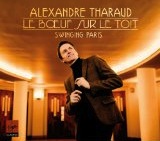Symphony soloists show off but the tiniest facet of who they are. French pianist Alexandre Tharaud’s Haydn concerto for the TSO this weekend may sparkle, but it barely cracks open the door on this remarkable artist whose latest album is a fantastic and fantastical headfirst dive into Parisian nightlife of the 1920s.
- Classical Music 101: What Does A Conductor Do? - June 17, 2019
- Classical Music 101 | What Does Period Instrument Mean? - May 6, 2019
- CLASSICAL MUSIC 101 | What Does It Mean To Be In Tune? - April 23, 2019
Tharaud is one of the lucky tiny handful of artists who has been given carte blanche by his big label (EMI/Virgin) to do whatever he wants. Over the past few years, he has alternated very serious albums focused on single composers (Chopin and Scarlatti most recently) with lighter fare (a terriffic homage to Erik Satie was the last).
 This fall, Tharaud and an all-star cast of collaborators whisk us off into Ford Model A-shaped time machine to post-World War I Paris, a time when ex-GIs didn’t suffer from post-traumatic stress, instead chanelling their pent-up energy and anxiety and frustrations into making and consuming experimental theatre, music, literature and substances both legal and banned.
This fall, Tharaud and an all-star cast of collaborators whisk us off into Ford Model A-shaped time machine to post-World War I Paris, a time when ex-GIs didn’t suffer from post-traumatic stress, instead chanelling their pent-up energy and anxiety and frustrations into making and consuming experimental theatre, music, literature and substances both legal and banned.
The fact that Paris was full of American solders helped add jazz to the mix.
The album, Le Boeuf sur le toit: Swinging Paris, is named after a Parisian bar that, in turn, was named after Darius Milhaud’s 1920 ballet. It became the place to go to hear the latest fusions of art music and jazz. Jean Cocteau was a regular, as were Les Six, the great, witty, eclectic group of composer friends Milhaud, Georges Auric, Jean Françaix, Arthur Honegger, Francis Poulenc and Germaine Taillefer.
The main pianists in the bar were the Belgian Clément Doucet, whose signature party pieces were classics by such composers as Chopin turned into jazzy foxtrots and Charlestons, and his duo partner, Parisian Jean Wiéner.
Using Doucet and Wiéner’s brilliant piano arrangements as jumping-off points, Tharaud has assembled a best-of album that sounds and feels like One Last Night at Le Beouf.
Tharaud’s playing is spot-on, capturing the virtuosic side as strongly as the pure (and often not so pure) spirit of fun behind the music. For two-piano and four-hand pieces, he is joined by the capable Frank Braley.
Among the other guests, operatic soprano Natalie Dessay is here to sing blues. Madeleine Peyroux (no stranger to Toronto) pops in for a spot of Cole Porter (“Let’s Do It”). Both singers also join in with all the other collaborators as “The Virgin Voices” whenever a chorus is needed.
The people who rocked Berlin, Paris and New York before the Great Depression and fascism are long gone, but Tharaud’s project brings a vibrant slice of this part back to vivid life.
This was, after all, the last time art music felt comfortable sharing a smoke-filled room with jazz and pop. It is a moment worth savouring.
Here is EMI Canada’s pathetic page for the album. Fortunately, there’s more information on Amazon, here.
Here is Tharaud and French cabaret-pop singer Juliette with “J’ai pas su y faire” (I Didn’t Know How to Do It), a sweet lament from 1923, followed George Gershwin’s “The Man I Love” and the album’s opening piece, the weird and wonderful Chopinata by Clément Doucet:
John Terauds
- Classical Music 101: What Does A Conductor Do? - June 17, 2019
- Classical Music 101 | What Does Period Instrument Mean? - May 6, 2019
- CLASSICAL MUSIC 101 | What Does It Mean To Be In Tune? - April 23, 2019




